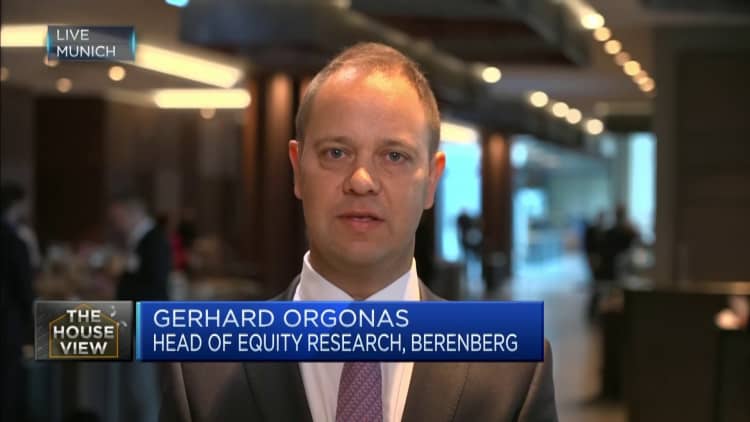German Chancellor Olaf Scholz final week declared a bundle worth 200 billion euros ($198 billion) designed to help with soaring vitality price ranges. The “defensive shield” features a gasoline value brake and a slash in product sales tax for fuel.
Steffi Loos | Pool | Reuters
Amid downbeat predictions of a economic downturn in Germany and the wider location, analysts at one particular Wall Avenue bank have shared wider issues about violent bond market moves and European governments wanting to borrow large sums of cash.
German Chancellor Olaf Scholz previous 7 days announced a bundle value 200 billion euros ($198 billion) built to support with soaring electricity selling prices. The “defensive shield” features a gasoline rate brake and a slash in profits tax for fuel.
The proposals could minimize 2 share points off inflation in the up coming 12 months, in accordance to Citi, but they are unlikely to avert an economic contraction. The offer “might soften the coming recession but also poses threats, in our see,” Citi analysts claimed in a take note released final Friday.
Those people challenges relate to the concern of how the deal will be financed and what that could do to inflation, to Germany’s sovereign bond yields, to the European Central Bank’s benchmark level, and to the borrowing ideas of other euro nations that might do the same.
Germany’s example
“The danger is that other folks could comply with that example,” Christian Schulz, deputy main European economist at Citi, informed CNBC’s “Street Signals Europe” on Monday.
Schulz famous the U.K.’s modern bond sector blowup after unfunded tax cuts by the British govt. Level anticipations and bond yields surged in Britain final thirty day period right after a swathe of tax bulletins. It caused the Bank of England to unleash a new bond-getting program, mayhem in the home loan industry and chat of a housing disaster.
Schulz mentioned Germany could “pay for” any personal debt financing thanks to its reduced financial debt-to-GDP ratio and decreased external funding requires, but the bundle could open the door for fewer fiscally prudent international locations to want to borrow significant quantities and difficulty new financial debt — perhaps foremost to hassle like that noticed in the U.K. Citi predicts that German debt financing could also drive tighter ECB policy, which could then also send out yields surging in the euro area.
“The threat is that this identical dynamic [seen in Britain] evolves on the continent as perfectly now,” Schulz stated.

“The way [Germany] want[s] to do it is by employing an existing SPV [special purpose vehicle], an off harmony sheet fund …. irrespective of whether which is going to direct to borrowing or whether it’s heading to lead to assured loans — due to the fact this fund can do equally — we shall see,” he additional, referring to the 200 billion euro plan.
Germany’s Federal Audit Court docket criticized the government and suggested it experienced dodged tax regulations to fund the package deal, according to Politico.
Other banking companies and establishments pointed to the difficult setting in Germany — the greatest European economy and an engine home for euro region advancement — which is now trying to abruptly wean by itself off of Russian fossil fuels.
Berenberg Economics stated in a modern note that purchaser self confidence in Germany, and the euro zone a lot more normally, has plunged to a history lower, which it claimed is “a prelude to economic downturn.” Indeed, the Institute for Economic Analysis predicts expenditure will plummet by 25% and expects a German economic downturn in 2023.
Deutsche Lender analysts estimate that the “defensive defend” could improve home income and restrict the projected GDP drop in 2023 to about 2%. Which is far better than their previous forecast of a 3.5% contraction.
Economic downturn could be on the playing cards
ECB President Christine Lagarde hinted at even more fascination amount hikes, saying on Sept. 28 that the bank was “not at neutral prices however.”

Talking at the Frankfurt Forum, Lagarde claimed the most recent hikes — most lately an unprecedented 75 foundation point boost in September that demolished the region’s observe file of detrimental premiums — were being just “the first vacation spot on the journey.” The ECB president explained the establishment would “do what [it has] to do” in get to return to its 2% inflation goal in the medium time period.
Though the EU and U.S. will see optimistic expansion this calendar year all round, “the indications are there of a slowdown and a recession can no for a longer time be dominated out,” European commissioner for overall economy, Paolo Gentiloni, advised CNBC’s Annette Weisbach at the Frankfurt Forum. “We are getting into a phase of stagnation and doable economic downturn,” Gentiloni reported by using video backlink.
That sentiment was echoed by Environment Trade Organization director-normal Ngozi Okonjo-Iweala. “My fear is that all indicators are likely in the completely wrong direction,” Okonjo-Iweala advised CNBC’s Julianna Tatelbaum in Brussels at an crisis power assembly last month — but she stated she disliked the word “recession.”
“Let us say ‘slowing’ and let us say we are inching in direction of the ‘R’,” she said.












More Stories
10 Misleading Promises SEO Agencies Tell You
How to Champion Your Brand With Social Media Advocacy Content
Malaysia’s new PM Anwar Ibrahim vows to unify country, fight corruption